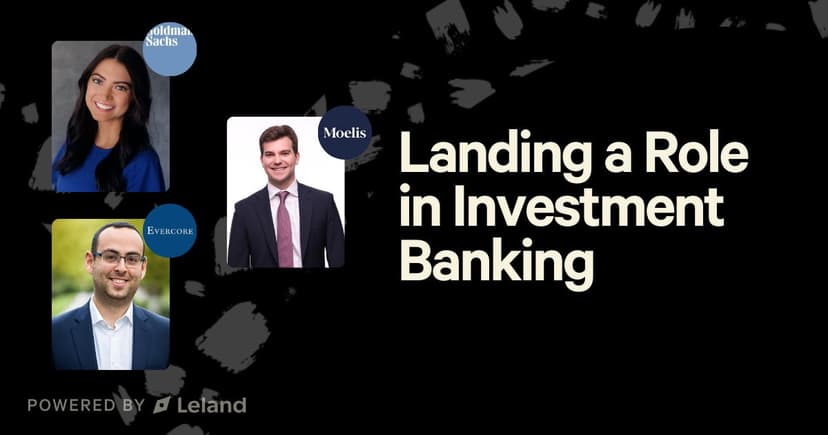Morgan Stanley Internship Guide: Process, Questions, & Tips (2025)
Get a Morgan Stanley internship with this step-by-step guide—application tips, interview prep, timelines, and insider advice from real coaches.
Posted July 11, 2025

Join a free event
Learn from top coaches and industry experts in live, interactive sessions you can join for free.
Table of Contents
Breaking into Morgan Stanley isn’t just about checking boxes; it’s about outshining thousands of equally qualified applicants. Whether you’re a sophomore aiming for the early programs or a junior targeting the Summer Analyst role, this guide will walk you through exactly how to stand out. From networking to interviews to offer conversion, you’ll get insider strategies that real interns have used to land the job and take their first steps into a successful career in the financial industry..
Why Intern at Morgan Stanley?
A Morgan Stanley internship isn’t just a line on your resume—it’s a launchpad. The firm is a global leader in investment banking, wealth management, and investment management, and consistently ranks among the most sought-after destinations for students in finance.
Interns gain valuable hands-on experience, build a strong professional network, and work on high-impact projects that can lead to a full-time analyst offer.
Other Benefits Include:
- Exposure to real clients, deals, and financial products
- Learning from mentors with diverse perspectives
- Training in cutting-edge tools and innovative solutions
- Competitive base pay and housing stipends in New York and other locations
Types of Morgan Stanley Internships
Freshman/Sophomore Programs
Designed for recent graduates and underclassmen from different backgrounds, these include:
- Freshman Enhancement Program (select schools)
- Sophomore Summer Analyst in Sales, Trading, or Research
- Diversity-focused pipelines for technology, operations, and risk management
These early pipelines offer hands-on experience and are often feeders for the junior-year Summer Analyst program.
Junior Summer Analyst Internships
This is the most competitive entry point and spans:
- Investment Banking
- Global Capital Markets
- Internal Audit
- Fixed Income Sales & Trading
- Equity Research
- Technology, Compliance, and Operations
These roles demand strong analytical skills, communication, and the ability to solve complex problems.
MBA & Off-Cycle Opportunities
Graduate-level and international students can apply to:
- MBA Summer Associate roles
- Off-cycle internships in London, Hong Kong, and beyond
Morgan Stanley Internship Application Timeline
| Date | Phase | What Happens + Expert Insight |
|---|---|---|
| February–March 2025 | Early Networking | Begin reaching out to alumni and recruiters. Attend virtual info sessions, firm webinars, and diversity events. This is when referral pipelines often begin forming. |
| April–May 2025 | Applications Open (Soft Launch) | Some roles open early (diversity, tech, select schools). Keep an eye on Handshake, firm portals, and email lists. Apply within 3–5 days of posting—Morgan Stanley uses rolling admissions. |
| June 2025 | General Application Launch | Most Summer Analyst and Sophomore Summer Analyst roles go live. Prepare polished resumes, get referrals in place, and submit quickly. |
| June–July 2025 | HireVue & Early Interviews | Candidates receive HireVues within 1–2 weeks of applying. Use this time to rehearse behavioral questions and record standout responses. Some divisions (e.g., Wealth Mgmt, Ops) may fast-track. |
| July–August 2025 | First-Round Interviews | Phone or Zoom interviews with analysts and associates. Behavioral + technical focus. Often a key filter for Superday selection. |
| August–October 2025 | Superdays & Offers | Final round with 3–5 back-to-back interviews (VPs, Directors, MDs). Offers can come same day or within a week. Most Investment Banking and Global Capital Markets spots are filled by mid-October. |
| May–August 2026 | Internship Begins | Interns start 10-week programs in New York and other global offices. Training, team integration, and real deal exposure begin from Day 1. Return offer decisions usually made in final weeks. |
Pro tip: Apply within 7–10 days of the posting going live. Morgan Stanley reviews on a rolling basis.
What Morgan Stanley Looks for in Interns
The firm values:
- Strong academic performance (3.5+ GPA is common)
- Clear interest in finance, business, or computer science
- Exceptional analytical skills
- Ability to work well on a team and communicate under pressure
- Motivation to drive greater impact and achieve financial goals
You don’t need a finance major, but you do need a compelling reason for wanting to work at the firm and in the financial services space.
How to Stand Out in the Application Process
Resume Tips
- Lead with high-impact finance experiences - Prioritize internships, case comps, finance clubs (e.g., “Researched and pitched equities in a student-run fund with $100K AUM”).
- Quantify everything
Numbers = credibility. Use metrics like:
- “Built a 3-statement model and pitch deck for $20M Series B SaaS company in a student VC fund.”
- “Ranked Top 10% in corporate valuation class of 150”
- Highlight technical skills - Especially for IBD, GCM, and trading roles: Excel (modeling), Python, SQL, PowerPoint, Bloomberg, CapIQ, FactSet.
- Use a clean, professional format - No fluff. One page. Bullet-driven. Include GPA, expected grad date, and relevant coursework.
Red flags to avoid:
- No finance or quantitative experience
- Vague verbs (“worked on,” “helped with”)
- Lack of metrics or outcomes
Networking & Referrals
- Identify alumni and past interns. Use LinkedIn filters by company + school. Prioritize recent grads—they’re more likely to respond and help.
- Send a tight, personalized message. Example: “Hi [Name], I’m a sophomore at [School] interested in MS IBD. I’d love to hear about your experience and any advice you’d give someone preparing for next summer’s recruiting cycle.”
- Have a value-driven conversation - Ask about their internship path, what surprised them, and how they prepped. Don’t ask for a referral—earn it.
- Follow up like a pro. Thank them, reference something specific you learned, and stay in touch if the conversation goes well.
- Track your outreach. Use a spreadsheet or Notion table to track who you’ve contacted, when, and the outcomes.
Behavioral + Technical Interview Prep
Morgan Stanley uses behavioral, technical, and sometimes case-based interviews. You’ll often start with a HireVue or phone screen.
Behavioral Tips
- Use the STAR method
- Demonstrate skills like leadership, teamwork, and initiative
- Tie experiences back to why you’re a strong fit for the program
Technical Topics to Cover
- Valuation: DCF, comps, precedent transactions
- Financial statements and ratios
- Market awareness and recent deals
- For trading roles: market views, pitch a stock or trade idea
Morgan Stanley Internship Interview Process
| Step | Stage | Format | Timing | What to Expect + Expert Tips |
|---|---|---|---|---|
| Step 1 | Online Application | Firm portal or campus system | April–June 2025 | Submit your application as early as possible (within 3–5 days of opening). Include tailored resumes for each division (IBD, GCM, WM, etc.). Most groups review on a rolling basis. |
| Step 2 | Digital Pre-Screen | HireVue video (automated) | Within 1–2 weeks of applying | You’ll record answers to 3–5 behavioral/fit questions (e.g., "Why Morgan Stanley?", "Tell me about a challenge"). Expect 30–60 seconds to prepare, then 1–2 minutes to respond. No retakes. Practice with a coach or tool. |
| Step 3 | First-Round Interview | 1–2 phone or Zoom interviews | July–August 2025 | Conducted by analysts or associates. One behavioral + one technical (especially for IBD/Markets roles). Know your resume cold, prep technicals (DCF, 3-statement, markets), and bring smart questions. |
| Step 4 | Superday | 3–5 back-to-back live interviews | August–October 2025 | Held virtually or in-office. You'll meet with VPs, Directors, and sometimes MDs. Interviews test technical rigor, business intuition, cultural fit, and communication. Expect brainteasers or case prompts in some divisions (especially Markets & GCM). |
| Step 5 | Offer & Background Check | Email + onboarding portal | Within 1 week of Superday | Some receive offers the same day; others may wait several days. Once you accept, you’ll complete background checks and prep for onboarding. For return offers, expect check-ins during the internship. |
Note: Some groups, like Global Capital Markets or Internal Audit, may include group exercises or case studies. You’ll be tested on your ability to work in a team, solve complex problems, and demonstrate your interest in financial services.
Sample Interview Questions (Behavioral + Technical)
Behavioral Interview Questions
Q1: Why Morgan Stanley?
What they’re testing: Cultural fit, motivation, firm knowledge.
Sample Answer: "I’m drawn to Morgan Stanley because of its strength in both traditional investment banking and innovative platforms like its wealth and asset management arms. I’ve spoken with several alumni from my school who interned here, and they consistently mentioned how the firm invests in intern development and gives real responsibility early on. I also admire Morgan Stanley’s leadership in sustainability-linked financing and want to contribute to a team that’s driving new standards in the industry."
Expert Tip: Include something specific—like a deal, team, or value (e.g., “ideas-driven culture”). Name-drop alumni if possible.
Q2: Tell me about a time you worked with a difficult team member.
What they’re testing: Teamwork, maturity, conflict resolution.
Sample Answer: "In a case competition, one team member missed multiple deadlines and didn’t contribute during meetings. Instead of confronting them directly, I asked them to co-lead a specific section and scheduled shorter daily check-ins. It helped them feel more engaged and accountable. We ended up placing in the finals, and I learned how important structure and ownership are in managing team dynamics."
Expert Tip: Use the STAR method (Situation, Task, Action, Result). Keep it professional—don’t sound resentful or blaming.
Q3: What’s a time you showed leadership under pressure?
What they’re testing: Initiative, resilience, judgment.
Sample Answer: "During my finance internship, our team lead fell sick two days before an internal investment committee pitch. I stepped in to update the valuation model and led the final deck presentation. I delegated sections to other interns and checked all assumptions against our market comps. The pitch went smoothly, and the company was moved to the diligence phase. It taught me how to stay focused and lead even without formal authority."
Expert Tip: Don’t fake high-stakes heroics—real leadership is often about composure and decision-making under ambiguity.
Read: The 50 Most Common Investment Banking Behavioral Questions (With Answers)
Technical Interview Questions
Q1: Walk me through a DCF.
What they’re testing: Core modeling knowledge.
Sample Answer: "First, I’d project the company’s free cash flows for 5–10 years using revenue, operating margins, and changes in working capital. Then, I’d calculate the terminal value—typically using the Gordon Growth or exit multiple method. I’d discount all cash flows back to present value using WACC to get the enterprise value. To get equity value, I’d subtract net debt from EV and divide by shares outstanding."
Expert Tip: Know the structure cold, but also understand assumptions behind WACC, growth rates, and terminal value.
Q2: How are the three financial statements linked?
Sample Answer: "Net income from the income statement flows into retained earnings on the balance sheet and the top line of the cash flow statement. The cash flow statement adjusts for non-cash items and changes in working capital to arrive at net cash. That cash impacts the balance sheet via cash and equivalents. CapEx and financing changes also affect long-term assets and liabilities on the balance sheet."
Expert Tip: Practice sketching the flow out. Interviewers may follow up with, “What happens when depreciation goes up by $10?”
Q3: What’s happening in the fixed income or equities markets right now?
Sample Answer: "As of June 2024, equities are trading with volatility due to persistent inflation pressure and delayed Fed rate cuts. Tech and AI-driven names have outperformed, while cyclicals lag. In fixed income, long-duration Treasuries have rallied recently as expectations for future rate hikes have eased. Credit spreads remain relatively tight, indicating stable corporate sentiment despite macro uncertainty."
Expert Tip: Always tie your market take to a specific sector or asset class you're interested in (especially for GCM or trading). Read WSJ/FT daily.
Want to practice these questions live with a former Morgan Stanley interviewer? Book a mock interview with a top IB coach!
Read: How to Ace Your Morgan Stanley Interview: With Sample Questions & Answers
What It’s Like to Intern at Morgan Stanley
Interns join real-deal teams and work closely with full-time analysts, associates, and VPs. Depending on your division, you might:
- Build pitch decks for capital raises
- Analyze financial products
- Attend client meetings
- Shadow traders and salespeople
- Work on internal strategy or compliance projects
Interns are evaluated regularly on performance, attitude, and their fit with the firm’s ideas-driven culture.
Offers, Return Rates, and Full-Time Conversion
Morgan Stanley uses its internship pipeline as the primary feeder into full-time roles, especially for front-office teams in Investment Banking, Global Capital Markets, Sales & Trading, and Wealth Management. Performing well as a summer intern is the most reliable path to a full-time offer at the firm.
What’s the Return Offer Rate?
- Investment Banking / Markets (NYC): ~60–70%
- Wealth Management / Research / Technology: ~50–65%
- Operations, Risk, Internal Audit: ~40–55%
Return offer rates can vary significantly by division, team capacity, intern class size, and market conditions.
In years with fewer full-time roles, some interns may be pooled and matched across groups or global offices.
Key Takeaways: Landing a Morgan Stanley Internship
- Apply early: Most roles open between April and June the year before. Apply within a week of posting—Morgan Stanley reviews on a rolling basis.
- Target the right program: Whether you're a freshman, sophomore, junior, or MBA student, match your background to the correct internship track (e.g., Summer Analyst, Sophomore Program, Off-Cycle, etc.).
- Tailor your resume: Highlight finance-relevant experiences, quantify results, and show technical skills like Excel, Python, or market research tools.
- Network smartly: Reach out to alumni and former interns for real insights, not just referrals. Informational chats often lead to early interviews or internal flags.
- Prep for interviews now: Practice HireVue responses, review technical concepts (DCF, financial statements), and stay up to date on markets.
- Know the return offer game: About 50–70% of interns get return offers. What matters most: consistent performance, strong feedback, and being a great team fit.
- Use Leland for an edge: Work with former Morgan Stanley interns, analysts, and interviewers to get real prep, tailored feedback, and insider advice.
Final Thoughts: Launch Your Finance Career at Morgan Stanley
Getting a Morgan Stanley internship is no easy feat, but with the right prep, you can absolutely stand out. Use this guide to map your strategy, and don’t be afraid to ask for help.
Want personalized coaching from a former Morgan Stanley intern or banker? Work with a top investment banking coach here.
Read these next:
- The Top 10 Investment Banks – By Size & Tier
- How to Break Into Investment Banking–What to Do From Freshman to Senior Year
- A Day in the Life of an Investment Banker: Role, Hours, & Responsibilities
- How to Nail the Second Most Common Investment Banking Interview Question ("Why This Firm?")
- Investment Banking Interview Guide: What to Know
FAQs
How long is a Morgan Stanley internship, and does it offer off-cycle options?
- Morgan Stanley’s standard summer internships last 10 weeks, typically running from late May to early August. These are the most common entry points for undergraduates and MBAs. The firm also offers off-cycle internships (typically 3–6 months) in select locations like London, Hong Kong, and continental Europe. Off-cycle roles are common in Investment Banking, Global Capital Markets, Risk, and Internal Audit, and often align with academic calendars outside the U.S. Off-cycle roles may open at any time of year and are more common at the graduate level.
What types of online assessments are required before Morgan Stanley interviews?
- Numerical reasoning (e.g., interpreting data tables, percentages, growth rates)
- Verbal reasoning (e.g., reading comprehension, logical deductions)
- Situational Judgment Tests (SJTs) evaluate how you’d respond in workplace scenarios
- Logical reasoning (e.g., pattern recognition or sequences)
- Coding assessments for technical or engineering roles (e.g., HackerRank)
What should you expect at Morgan Stanley’s Superday or assessment centre?
- 3–5 back-to-back interviews with analysts, associates, and senior bankers
- A mix of behavioral, technical, and fit questions
- For Markets/GCM: Market-based discussions, trade pitches, or current events analysis
- For some roles: Group exercises, case studies, or a short presentation task
How much do Morgan Stanley interns get paid, and what benefits are included?
- Investment Banking & Markets interns in New York typically earn $110K–$120K annualized, or about $9K–$10K/month over the 10-week program. Interns in other divisions (e.g., Wealth Mgmt, Technology, Ops) may earn slightly less depending on location and role. Benefits often include:
- Housing stipends (varies by office)
- Transportation support
- Access to professional development programs
- Executive speaker events
- Firm-wide networking socials
- On-the-desk mentorship and return offer consideration
Will Superday at Morgan Stanley be individual interviews or panel interviews?
- Superday interviews at Morgan Stanley are typically one-on-one interviews conducted back-to-back. You’ll meet with multiple people across levels—analysts, associates, VPs, and sometimes MDs. However, in some divisions (especially Markets or Operations), Superdays may include: Panel interviews (2 interviewers at once), Group discussions or short presentations, Written exercises or technical case scenarios

























